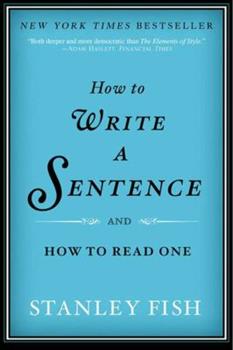How to Read to Read a Sentence and How to Write One, by Stanley Fish
When I’m reading, the sentence is for me the coin of a book’s realm, the catch that holds me fast to a story—and Stanley Fish’s book is about sentences, and only sentences. A professor of law and dean emeritus at the College of Liberal Arts and Sciences at the University of Illinois, Fish looks at both structure and content in a way that is intellectually rigorous and personal, and he is a champion of the well-crafted sentence.
Here, for example, is his description of how sentences move a reader:
“…words so precisely placed that in combination with other words, also precisely placed, they carve out a shape in space and time.”
For Fish, Writing Isn’t About Content
From his stance that learning to write isn’t about content (“content,” he says, “is always the enemy of writing instruction”), but about the structural relationships within the parts of a sentence.
Fish is a keen advocate of literature, and once he defines his view of what a sentence is, and what it does, as he succinctly describes here, moves to examples. He also looks closely at language construction. Just as carpenters love the sap fragrance of timber and the sound of a hammer on the head of nail, writers (those for whom language is part of the job—and the pleasure of writing) are prone to a fascination with the nuts and bolts of a sentence. Fish examines structure, syntax, grammar, and usage, all in his clear, easy style. Words can be lumbering, maddeningly opaque things, a point Fish affirms: “Before the words slide into their slots, they are just discrete items, pointing everywhere and nowhere.”
I wholeheartedly agree with his advice for writers to “make language so transparent a medium that it disappears and interposes no obstacle or screen between the reader and the thing it points to.” Though it’s one thing to intend and another to achieve. I learned a lot from this book, and felt well-advised by Fish. As a curator of sentences, he has excellent taste. Here, he cites a line from Anthony Burgess’s novel Enderby Outside (1968):
And the words slide into the slots ordained by syntax, and glitter as with atmospheric dust with those impurities which we call meaning.
Some Exemplary Sentences
Here is a sampling of sentences Fish endorses as structurally sound, but transportive as well:
Ford Madox Ford’s The Good Soldier: “And I shall go on talking in a low voice
while the sea sounds in the distance and overhead the great black flood of wind
polishes the bright stars.”
The last line of Norman Maclean’s A River Runs Through It, “I am haunted by waters.”
John Updike’s description of Ted Williams’ final home run: “It was in the books while it was still in the air.”
Watch Stanley Fish in an interview hosted by Cardoza Law School, here.
—Lauren Alwan


